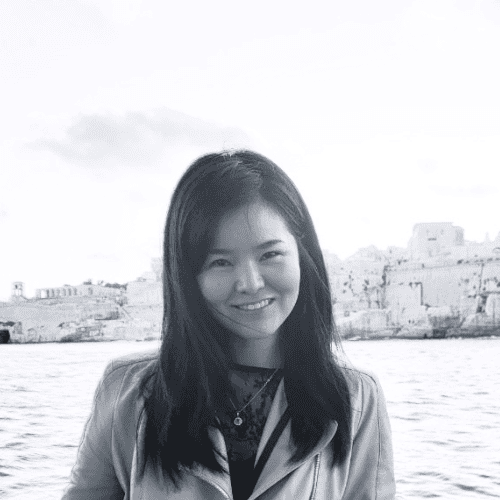
Wenise Kim is a Sydney-based Korean human rights advocate, focused on crimes against humanity perpetrated by the North Korean regime since the ‘temporary’ division of the peninsula in 1953. She is convinced that the case of North Korea provides a unique perspective on the fragility of freedoms and liberty in our modern world and the fundamentals of democratic values as a bedrock for advancing universal human rights that transcends generations and geopolitics.
Wenise participated in DTP’s Annual Regional Human Rights and Peoples’ Diplomacy Training in Nepal in 2014 to broaden her exposure to activism in the Asia-Pacific region, after a foretaste of advocacy in Europe and the Middle East, including at Salzburg Global Seminar and Yad Vashem Holocaust Memorial.
DTP served as her first opportunity to interact and learn from a diverse group of young activists from the Global South, in particular. A sense of duty was renewed in her through this, she says, due to what her motherland “South” Korea represented for many participants – a success model that symbolised hope and possibility risen from the ashes of the Korean War. This response left an impression that shaped Wenise’s future advocacy.
“DTP training has not only opened my eyes to the particular vulnerabilities certain groups of people face in Asia-Pacific, but also reminded me as to why this work is vital. It is slow, but is bigger than us as individuals, and that’s resilience. I will always reflect on the precious interactions I’ve had with fellow participants when times are tough”.
As an emerging activist, Wenise also found the training highly practical and a ‘total package’.
“The training was intensive for all the right reasons with opportunities to apply the skills. A highlight for me was ‘advocacy-on-the ground’ at the Australian High Commission in Kathmandu. I’d taken a freshly printed booklet with me and gave a brief on the modern-day slavery and human trafficking faced by North Korean women to the Ambassador. I shared copies of signed books and resources to those who were keen to learn more about North Korea and celebrated a milestone that the North Korean Human Rights Resolution had passed unanimously right then in Geneva as we held conversations. These moments of solidarity have stayed with me.”
Wenise attributes her strong views on the importance of resilience and solidarity to her time at the Sydney Jewish Museum as a volunteer researcher. She says the way Jewish people advocated for justice following the Holocaust is truly inspiring, and a model that she would like to emulate for the story of North Koreans, given the stark similarities in the root cause of the violations and their extreme nature.
“I feel indebted to the Jewish community and the scholarship who turned this tragedy into a field of study that has conceptualised ‘human rights’ as we understand it today, with the establishment of the UDHR and continued efforts for genocide prevention education, among others.”
Wenise later joined the Ministry of Foreign Affairs in Korea, working in positions covering political-economic affairs and public diplomacy in countries including Sri Lanka, Sudan and Eritrea before deciding to pursue more meaningful opportunities for advocacy outside the ‘formal’ world of diplomacy.
“I feel compelled to regain the momentum of advocacy as an activist. The UN’s CoI report marks 10th anniversary, and not much has changed. I don’t dare think I can “save” North Koreans – and the rescue efforts are treacherous. As someone who experienced best of both worlds, I want to help in depoliticising and mainstreaming the discussions of the violations in North Korea; an affront to humanity. It first requires convincing the defector community that their stories are not just ‘North Korean’ escape stories. Their sufferings stem from an unfinished dark chapter of a world history, one that deserves to be recognised and appreciated in a broader historical context across borders, especially by the field of genocide studies and educators. To me, this holds the key to teaching values and lessons the younger generations sometimes struggle to grasp today. In return, it will enhance our understandings of 21st century mass atrocities and stand in the gap”.
Wenise recently worked on a documentary film that captures the story of Australian veterans in the Korean War to defend democracy, and she is now planning a human rights study tour with visits to Holocaust memorials for young students from backgrounds that typically have little to no exposure to this part of world history. She welcomes opportunities for collaboration and engagement.
DTP acknowledges the traditional custodians of the land on which we work, the Bedegal people of the Eora Nation. We recognise their lands were never ceded, and we acknowledge their struggles for recognition and rights and pay our respects to the Elders – past, present – and the youth who are working towards a brighter tomorrow. This continent always was and always will be Aboriginal land.
Aboriginal and Torres Strait Islander peoples should be aware that this website contains images or names of people who have passed away.
DTP acknowledges the traditional custodians of the land on which we work, the Bedegal people of the Eora Nation. We recognise their lands were never ceded, and we acknowledge their struggles for recognition and rights and pay our respects to the Elders – past, present – and the youth who are working towards a brighter tomorrow. This continent always was and always will be Aboriginal land.
Aboriginal and Torres Strait Islander peoples should be aware that this website contains images or names of people who have passed away.
Privacy Policy | Terms of Use | Disclaimer | Policies
© 2022 Diplomacy Training Program | ABN 31 003 925 148 | Web Design by Studio Clvr